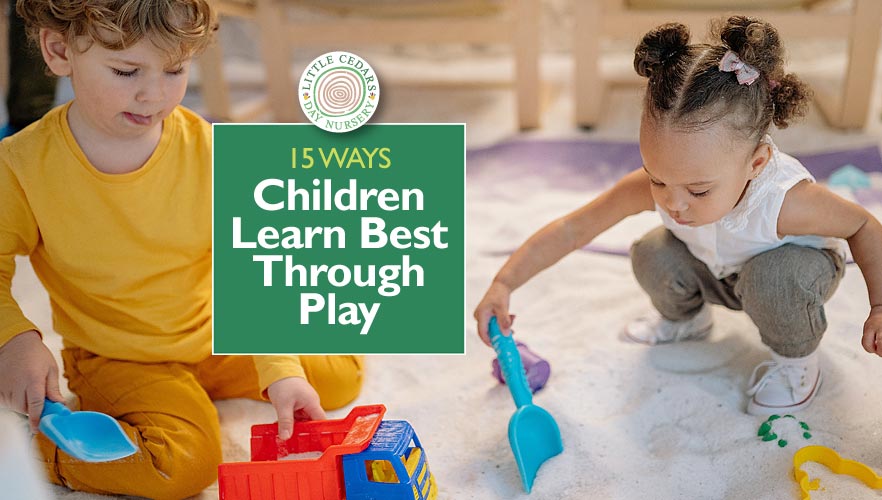
 Watch any infant, toddler or preschooler for just a few minutes and you’ll see that one thing comes naturally to them; play. Indeed, it’s as if they’ve been programmed that way, with the need to play coming instinctively to youngsters, whatever their species. Aside from it simply being great fun, there are a multitude of very good reasons for that — play teaches them an enormous amount about each other, themselves, other living things, cause and effect, and the world around them. It also allows them to learn and fine-tune a whole swathe of new skills as they grow older, play new games, and become more experienced. Add in some careful steering and nurturing during that play from Mum or Dad and they have a real recipe for success. With that in mind, we look today at the key ways in which learning through play profoundly benefits children.
Watch any infant, toddler or preschooler for just a few minutes and you’ll see that one thing comes naturally to them; play. Indeed, it’s as if they’ve been programmed that way, with the need to play coming instinctively to youngsters, whatever their species. Aside from it simply being great fun, there are a multitude of very good reasons for that — play teaches them an enormous amount about each other, themselves, other living things, cause and effect, and the world around them. It also allows them to learn and fine-tune a whole swathe of new skills as they grow older, play new games, and become more experienced. Add in some careful steering and nurturing during that play from Mum or Dad and they have a real recipe for success. With that in mind, we look today at the key ways in which learning through play profoundly benefits children.
1. Play & Creativity Go Hand-in-Hand
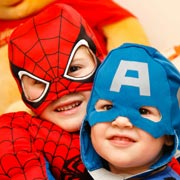 Play and creativity go hand-in-hand. Whether making up a new game, role-playing, constructing, or playing in a den, children will naturally create both scenarios and physical items as part of their play. Such activities teach them how to use their imaginations and to be creative — in a myriad of ways.
Play and creativity go hand-in-hand. Whether making up a new game, role-playing, constructing, or playing in a den, children will naturally create both scenarios and physical items as part of their play. Such activities teach them how to use their imaginations and to be creative — in a myriad of ways.
2. Play Boosts Problem-Solving & Critical Thinking Skills
During play, children will inevitably reach points where a problem needs to be solved or a challenge overcome. Such things will help to stretch children’s minds and stimulate thinking skills to help them invent new ways to do things, solve problems, accomplish tasks, or do something more efficiently. Problem-solving and critical thinking skills will benefit hugely in this way and these are crucial skills for children to learn as they grow older.
3. Play Hones Motor Skills
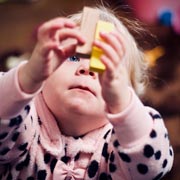 Different play activities require different types of movement and physical interaction from children. Indeed, this is a fundamental aspect of play. Whether jumping and running with large movements or carefully constructing with small items like building blocks, children will naturally hone both fine and gross motor skills during play. Such physical skills are essential to their ability to navigate and interact with the world around them and, in the most natural of ways, play is at the heart of enhancing those abilities.
Different play activities require different types of movement and physical interaction from children. Indeed, this is a fundamental aspect of play. Whether jumping and running with large movements or carefully constructing with small items like building blocks, children will naturally hone both fine and gross motor skills during play. Such physical skills are essential to their ability to navigate and interact with the world around them and, in the most natural of ways, play is at the heart of enhancing those abilities.
4. Play Makes Children Fitter
All that running around, chasing, jumping, hopping and playing games is sure to raise a child’s heart rate and, in time, get them a little out of breath. That’s great exercise, right there, but play makes it fun rather than a chore. And, as we know, exercise is good for us, helping to keep us more fit and healthy. In fact, along with a healthy, balanced, diet, it can even help children to reduce or avoid the prospect of childhood obesity.
5. Play is Good for Children’s Emotional Well-Being
Did you know that the hormone cortisol, which the body releases when under stress, reduces when children play? It just goes to prove that playing makes children happy — after all, it’s great fun — and that’s great for their overall emotional well-being.
6. Play Enhances Cognitive Skills
Playing not only improves physical fitness, motor skills and coordination, but it also improves brain function. After all, play takes a myriad of different forms, each type requiring a different mixture of concentration and cognitive skills to succeed. Play is, indeed, like a good workout for the mind, with every passing minute of play enabling the brain to form countless new connections that will stand a child in good stead through improved skills and knowledge going forward.
7. Play Improves Social Skills
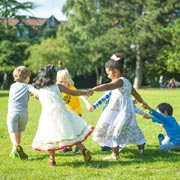 Social skills are also improved through play. Children naturally play with other children and, by so doing, will soon pick up social skills as they begin to better understand social protocols that allow them to succeed both as individuals and in groups. Decent manners, saying please and thank you, cooperation, teamwork and closer bonding are all examples of social skills that can benefit through group play. Other examples include conflict resolution, better sharing, negotiation and communication, which we’ll come to next.
Social skills are also improved through play. Children naturally play with other children and, by so doing, will soon pick up social skills as they begin to better understand social protocols that allow them to succeed both as individuals and in groups. Decent manners, saying please and thank you, cooperation, teamwork and closer bonding are all examples of social skills that can benefit through group play. Other examples include conflict resolution, better sharing, negotiation and communication, which we’ll come to next.
8. Play Helps Children Learn to Communicate Better
 Through all this play, children will be communicating with each other and with any adults that are supervising. As such, play is a great facilitator of communication. Indeed, good communication is essential to most games and, through it, children can cooperate and achieve in ways that will help them in both the short term and into adulthood. Improving communication skills is also a fundamental way to improve success when you think about it.
Through all this play, children will be communicating with each other and with any adults that are supervising. As such, play is a great facilitator of communication. Indeed, good communication is essential to most games and, through it, children can cooperate and achieve in ways that will help them in both the short term and into adulthood. Improving communication skills is also a fundamental way to improve success when you think about it.
9. Play Enhances Emotional Intelligence
Play also allows children to see things from one another’s perspectives. Role-play games are a great example and, through such endeavours, children can better understand how their actions might affect others. Through such play opportunities, they’ll learn to have improved empathy, patience, and perception of others. Those are important tools for any individual to master, both as children and as adults.
10. Play Stimulates Children’s Senses
One of the key ways babies and infants learn is through the senses and it’s through play that they often do this. Whether reaching out to touch a soft toy during tummy time, playing with coloured shapes, or progressing to creative play with play dough and suchlike when they’re older, they can learn a lot about the world through the senses during early play. Learn more about The Benefits of Sensory Play for Under-Fives here.
11. Play Makes Sense of Mathematics
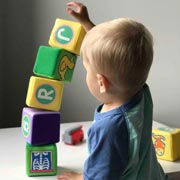 Mathematics is often embedded into games and pastimes. Children can learn, for example, about adding, subtracting, multiplication and division through games. Even dividing group play into teams requires some fundamental maths to ensure teams are equal in size. Building towers out of blocks is another great example where children can count how many blocks they can stack into a tower before it falls over. They can try to beat their own maximum, or even compete against one another to see who can use the most blocks.
Mathematics is often embedded into games and pastimes. Children can learn, for example, about adding, subtracting, multiplication and division through games. Even dividing group play into teams requires some fundamental maths to ensure teams are equal in size. Building towers out of blocks is another great example where children can count how many blocks they can stack into a tower before it falls over. They can try to beat their own maximum, or even compete against one another to see who can use the most blocks.
12. Play Teaches Children Real-World Science
Play also teaches children about science and how it applies to the real world around them. Properties of materials are a good example, with children learning to understand the properties of liquids, solids, play dough, gravity, heat and cold, cause and effect, and so on — often through the simple act of playing.
13. Play Teaches Children to Assess Risk
Another great skill that children can learn through play is that of risk assessment. Should they climb further up this tree or is it too dangerous? Should they add another block to their tower construction, or will it tip over? Can they leap across this puddle without getting wet? All such things are great examples of how simple play activities can teach children how to assess risk — and learn from it.
14. Play Educates Children About the World Around Them
 Play comes in a vast array of different forms, shapes, and sizes. Through so doing, it introduces children to countless scenarios, situations, and challenges. By immersing children into such widely differing environments, they learn huge amounts about the world around them, and everything within it. Whether it’s newfound knowledge about a new object, material, place, culture, activity, or something else, play is an amazing conduit to new knowledge and the need to learn new skills. Play is the ultimate educator and the incredible thing is that children may be unaware that they’re learning — they’re having too much fun!
Play comes in a vast array of different forms, shapes, and sizes. Through so doing, it introduces children to countless scenarios, situations, and challenges. By immersing children into such widely differing environments, they learn huge amounts about the world around them, and everything within it. Whether it’s newfound knowledge about a new object, material, place, culture, activity, or something else, play is an amazing conduit to new knowledge and the need to learn new skills. Play is the ultimate educator and the incredible thing is that children may be unaware that they’re learning — they’re having too much fun!
15. Play Makes Learning Fun & Natural
All in all, play teaches children a vast amount about the world around them, about themselves, and about others. It also teaches them a myriad of new skills. Incredibly, it makes such learning fun and totally natural. As such, play is an immensely powerful teacher that’s key to the success of every child’s early learning and development.
Children Learn Through Play at Little Cedars Nursery, Streatham
The childcare professionals at Little Cedars Nursery understand very well the superpowers of play. That’s why babies, toddlers and preschoolers learn mostly through play and child-led activities at the nursery in Streatham. Through play and a learning and development programme that’s custom-designed for each child, little ones absolutely thrive at Little Cedars, achieving personal bests in every area of the curriculum and personal development. In this way, we ensure they are as school-ready as possible by the time they leave us as they approach the age of five.
Nursery & Preschool Places at a Good Nursery/Preschool in Streatham

 Would you like to explore the possibility of your baby or under-five child attending Little Cedars Nursery in Streatham? We’re officially a ‘good provider’ of childcare and early years education and offer a warm, cosy, home-from-home environment where every child thrives and feels valued. We’re also conveniently located if you live or work near Streatham Hill, Streatham Park, Streatham Common, Furzedown, Tooting, Tooting Bec, Tooting Broadway, Tooting Common, Balham, Norbury and Colliers Wood. Get in touch today to get started on your application, to visit, or to find out more:
Would you like to explore the possibility of your baby or under-five child attending Little Cedars Nursery in Streatham? We’re officially a ‘good provider’ of childcare and early years education and offer a warm, cosy, home-from-home environment where every child thrives and feels valued. We’re also conveniently located if you live or work near Streatham Hill, Streatham Park, Streatham Common, Furzedown, Tooting, Tooting Bec, Tooting Broadway, Tooting Common, Balham, Norbury and Colliers Wood. Get in touch today to get started on your application, to visit, or to find out more:

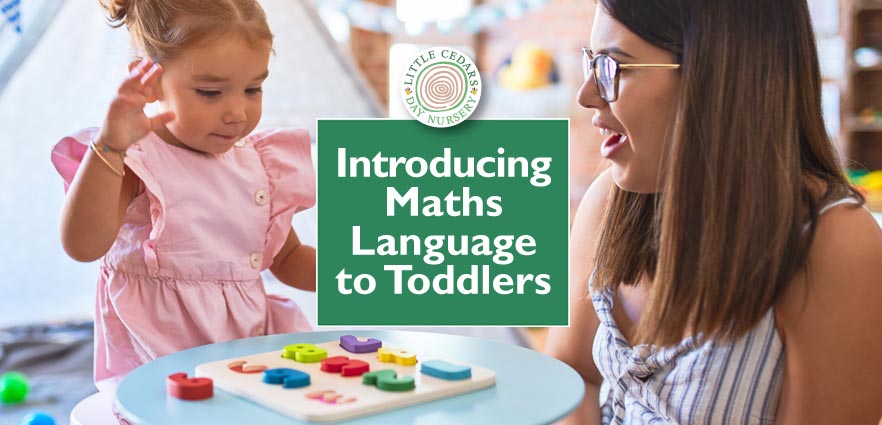
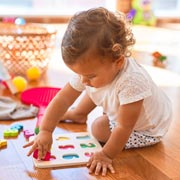 However, many children struggle with maths and have negative attitudes towards the topic. To prevent this, it is important to introduce maths concepts and vocabulary to children at a young age. Fortunately toddlers are at a period of development where they can learn and understand a range of maths words and concepts when given the opportunity. And, by introducing mathematical concepts and vocabulary to toddlers in a fun and engaging way, adults can help children develop a strong foundation in maths and foster a positive attitude towards the subject.
However, many children struggle with maths and have negative attitudes towards the topic. To prevent this, it is important to introduce maths concepts and vocabulary to children at a young age. Fortunately toddlers are at a period of development where they can learn and understand a range of maths words and concepts when given the opportunity. And, by introducing mathematical concepts and vocabulary to toddlers in a fun and engaging way, adults can help children develop a strong foundation in maths and foster a positive attitude towards the subject.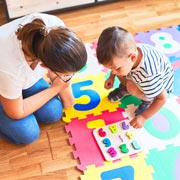 Introducing maths words and language to toddlers is all part of
Introducing maths words and language to toddlers is all part of 
 Parents and caregivers can help toddlers learn maths words and maths-related language in a variety of ways. General examples include:
Parents and caregivers can help toddlers learn maths words and maths-related language in a variety of ways. General examples include: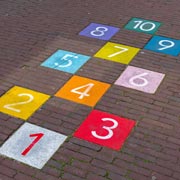 Number Hopscotch
Number Hopscotch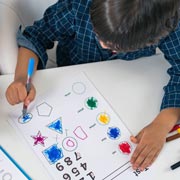 Parents can create simple patterns using objects such as blocks, toys, or coloured pencils, and ask toddlers to continue the pattern. This activity can help toddlers develop their pattern recognition skills and understand basic maths concepts such as repetition and sequencing.
Parents can create simple patterns using objects such as blocks, toys, or coloured pencils, and ask toddlers to continue the pattern. This activity can help toddlers develop their pattern recognition skills and understand basic maths concepts such as repetition and sequencing.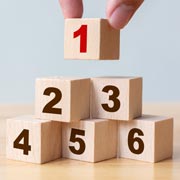 Introducing maths words and concepts to toddlers is an important step in fostering their overall learning and development as well as in relation to success in mathematics itself. By teaching toddlers maths vocabulary and concepts at a young age, we can help them develop strong foundations in maths, enhance their cognitive development and language skills, and improve their attitudes towards maths. It is never too early to start introducing maths concepts to children, and by doing so, we can help them develop a lifelong appreciation of maths as well as nurturing a strong foundation for future success in many areas of their lives.
Introducing maths words and concepts to toddlers is an important step in fostering their overall learning and development as well as in relation to success in mathematics itself. By teaching toddlers maths vocabulary and concepts at a young age, we can help them develop strong foundations in maths, enhance their cognitive development and language skills, and improve their attitudes towards maths. It is never too early to start introducing maths concepts to children, and by doing so, we can help them develop a lifelong appreciation of maths as well as nurturing a strong foundation for future success in many areas of their lives.
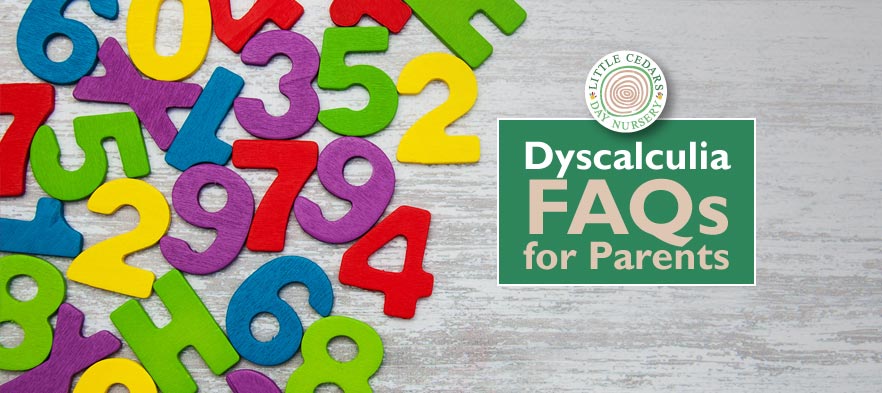
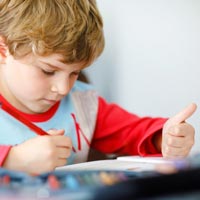 In today’s guide, we answer frequently asked questions (FAQs) about Dyscalculia, particularly in relation to children, including preschoolers. Around 5% of children of school age are thought to have dyscalculia.
In today’s guide, we answer frequently asked questions (FAQs) about Dyscalculia, particularly in relation to children, including preschoolers. Around 5% of children of school age are thought to have dyscalculia.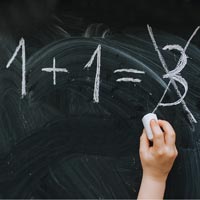 A few of the possible signs of dyscalculia include:
A few of the possible signs of dyscalculia include: They may also continue to use fingers to count long after their contemporaries have moved on to mental counting;
They may also continue to use fingers to count long after their contemporaries have moved on to mental counting; Just as with dyslexia, there is no cure for dyscalculia. However, there are many ways to help children cope with its effects. It’s also worth bearing in mind that children with dyscalculia can be very gifted in other areas, for example creativity, strategic thinking, problem solving, practical abilities and often great intuition.
Just as with dyslexia, there is no cure for dyscalculia. However, there are many ways to help children cope with its effects. It’s also worth bearing in mind that children with dyscalculia can be very gifted in other areas, for example creativity, strategic thinking, problem solving, practical abilities and often great intuition.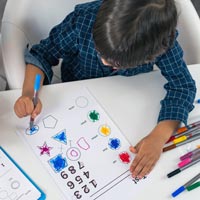 They can also benefit when important words and numbers are highlighted (to draw attention to their importance);
They can also benefit when important words and numbers are highlighted (to draw attention to their importance);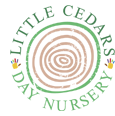 Childcare professionals at Little Cedars Nursery will look out for possible signs of dyscalculia — and any other learning difficulties — as a matter of course. If we spot anything, we’ll liaise with parents, guardians or carers to discuss ways in which we can all help, together. There are many ways to help children with learning difficulties. That’s true whether they’re at the nursery, at home, or when they are ready to move on to school. Helping children with challenges and any special educational needs is all part of the service at Little Cedars Nursery, Streatham. Indeed, one of our main goals is to help each child become the very best version of themselves.
Childcare professionals at Little Cedars Nursery will look out for possible signs of dyscalculia — and any other learning difficulties — as a matter of course. If we spot anything, we’ll liaise with parents, guardians or carers to discuss ways in which we can all help, together. There are many ways to help children with learning difficulties. That’s true whether they’re at the nursery, at home, or when they are ready to move on to school. Helping children with challenges and any special educational needs is all part of the service at Little Cedars Nursery, Streatham. Indeed, one of our main goals is to help each child become the very best version of themselves.